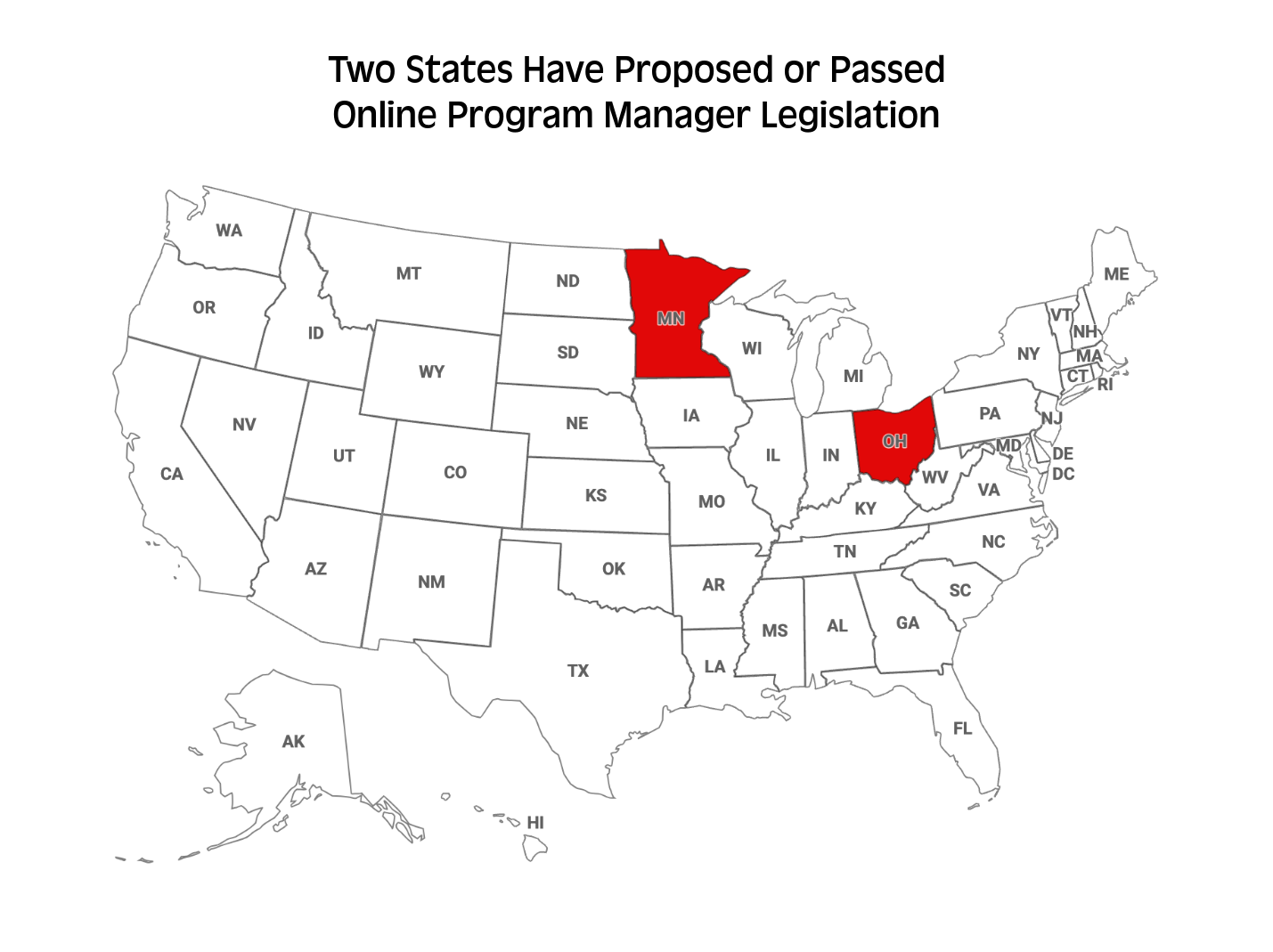
Congratulations to the Ohio Senate for restoring a large measure of reason in the treatment of online program managers (OPMs) in the latest version of legislation. OPMs are a huge benefit to public and private colleges because they help colleges innovate and reach students anywhere in the world at a low cost. They should be treated that way.
In April, I explained how Ohio House Bill No. 96 threatened to “make conservative Ohio look a lot more like progressive Minnesota,” the only other state that had legislated against OPMs.
Recently, the progressive group New America published a report that highlighted the comparison in a map like this:

New America is part of a network of anti-market activist organizations, including the usual revolving door between government and nonprofits, much of which is generously funded by the Arnold Foundation, which is all revved up to kill anything like the free market in education. (See the details compiled and documented by the American Accountability Foundation.) If I were an Ohio legislator, I would take pause to consider why this leftist advocacy group is urging the Buckeye State to accompany Minnesota when no other state—red or blue—has followed suit.
Nevertheless, instead of praising colleges for finding market-based solutions to better serve students, the legislation in the Ohio House did the opposite. It required a warning label when a college had an OPM partnership.
The bill also required prior approval from Ohio’s chancellor of higher education for every agreement between a college and an OPM, even for private colleges, regardless of the size and scope of the contract. This broad requirement interfered with academic freedom by second-guessing even private colleges’ choices about core topics such as admissions, curriculum, and institutional governance.
[RELATED: Vedder’s Case for Creative Destruction]
Even worse, if the chancellor disapproved of an OPM contract, the entire college could no longer enroll new students, effectively killing it. This provision was extreme and unjust.
Finally, the House bill let public colleges be put on “fiscal caution” status simply for having an OPM contract, no matter the size or scope. This is more than a black mark because it triggers a variety of financial compliance measures.
Thanks to the Senate, the worst of these provisions have been removed from the bill. No longer does the chancellor hold the key to a college’s life or death simply because of an OPM contract. Instead, the institution itself remains responsible for ensuring compliance with relevant state requirements, such as when the college must teach particular content in order for graduates to be licensable in a professional field.
Even so, the warning label is still there. Similarly, the “fiscal caution” problem persists, even though the words “online program manager” have been removed. In the Senate bill, a college can be put on fiscal caution status if it has “a substantial increase in the number of third-party service providers who are paid based on success” or if it has “significant changes in … compliance with satisfactory academic progress requirements in 34 C.F.R. 668.34, including an increase in the use of correspondence or asynchronous learning materials.”
What’s wrong with paying partners on the basis of success? That’s an irrational basis for dinging and denigrating a college.
Furthermore—to get into the weeds for a moment—the referenced part of the Code of Federal Regulations does not actually refer to asynchronous learning. In 2024, Biden’s Department of Education tried and failed to hurt distance education and for-profit education by removing asynchronous learning from the definition of a “clock hour” in its regulations. This change would have disqualified a huge proportion of students’ courses from federal student aid, even though asynchronous learning is a successful and growing mode of education.
So, to the extent that there is time for final revisions, I hope that legislators revisit the “fiscal caution” language in the bill. But it’s very good news that the progressive network has mostly failed to achieve its goals in Ohio—all thanks to the Ohio Senate.
Follow Adam Kissel on X.
Image: “Ohio State Senate” by John Beagle on Wikimedia Commons
“the definition of a “clock hour” in its regulations”
One of the untold scandals of higher education is how many fewer hours there are than there were 60 years ago. The desire to start after Labor Day and end before Christmas has led to a semester that some years is as short as 12-13 weeks. Cancelling classes on holidays — not done 40 years ago — shortens the semester even more, as does canceling them for snow.
And there is no way that one can learn as much in two 75 minute classes as in three 50 minute classes — let alone one 150 minute class.
What people don’t realize is that the Tuesday/Thursday classes once also met on Saturdays, that classes were held on holidays, and that final exams were in January.